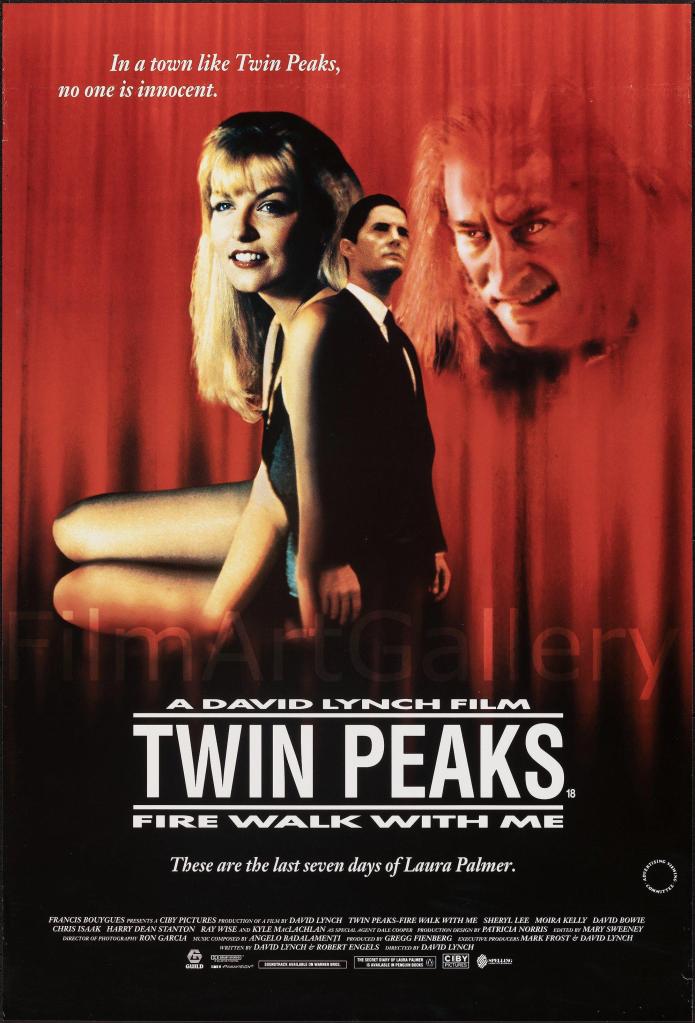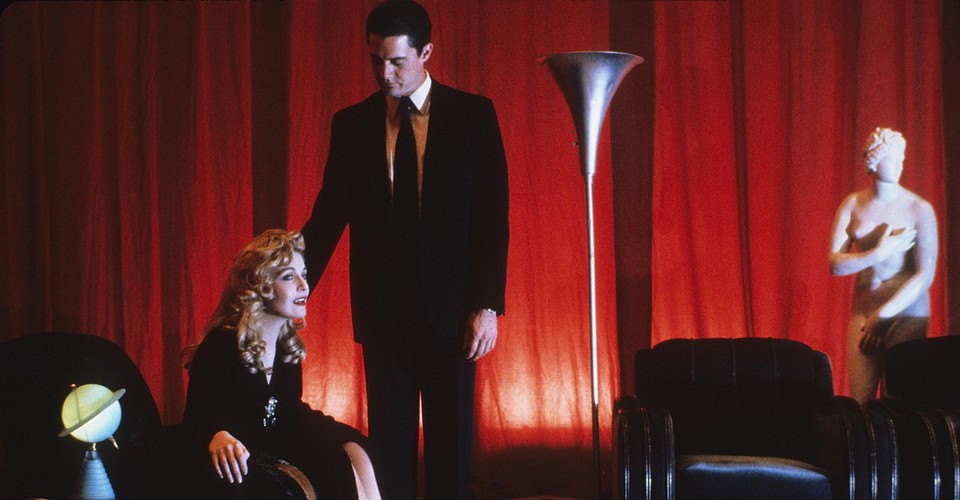
Let’s talk about the Lynch film nobody saw and less people remember. In Twin Peaks: Fire Walk With Me, you missed a masterpiece by one of cinema’s true masters. Let me tell you why.
Anyone who was there at the time will remember the hype around Twin Peaks: the surrealist filmmaker behind Eraserhead, The Elephant Man and Blue Velvet was coming to TV. Twin Peaks was the beginning of event TV. It was a huge hit.
However, Lynch dropped mostly off the Twin Peaks radar in season two to make Wild at Heart (1990). The world loved him. He returned two years later with Twin Peaks: Fire Walk With Me (1992) and the reaction was vitriolic.

The die-hard fans hated the second season: not dark enough, not enough mystery. The reveal of the murderer’s identity removed its hook. After filming Wild at Heart, Lynch returned to shoot the final episode, which remains one of the best pieces of work of his career. There was no season three. The story ends on a cliff-hanger.
The cast were a great mix of seasoned pros playing the adults and some relative unknowns playing the troubled youth of the town. The actor playing Bob was a member of the film crew whose reflection was caught in a mirror during the early filming of the pilot. Lynch liked the image so much, the guy got the role. Kyle MacLachlan, as Agent Cooper, the FBI agent investigating Laura’s murder, redeemed himself yet further after Dune. You almost forgive him for Showgirls, but that was in his future. Lynch’s turn as the FBI director struggling with his hearing aid is very funny.
That Gum You Like is Going to Come Back in Style
Many thought the purpose of the movie was to resolve the plot set up by that cliff-hanger. Apart from Mr Lynch, of course; that would be too obvious.
The film is the archetypal prequel. It opens long before Laura’s murder and follows Chris Isaak’s Agent Chet Desmond as he investigates a previous murder. Chet mysteriously disappears. Cooper turns up. Thus we learn Cooper is at least the second agent to investigate this case. David Bowie makes a fleeting appearance as yet another agent with a connection to it. Cut to Twin Peaks.

The Chet Desmond prologue is hated by many. However, it contains some of Lynch’s finest material. The Lil with the Sour Face sequence is sublime, Lynch’s own narrative logic runs riot here. Describing it as surreal fails to do it justice.
When we get to the town of Twin Peaks, it is noticeably different in tone to the one we knew from the series. The quaintness has gone. Lynch replaces it with oppressive darkness. Sheryl Lee (who played Laura Palmer both living and dead) spends the film screaming in terror. Many of the secondary characters are absent.
The biggest difference to the series, and what upset so many of the fans, was the change in theme. The series is (superficially) a ghost story, yet the film suggests the supernatural element is partly of Laura’s own manufacture, a psychological cover for the fact she is being sexually abused by her father. Lynch’s obvious mastery of filmmaking is on display here. His creation of the oppressive incestuous atmosphere in the Palmer household is so convincing, he said he got letters from incest survivors praising his work.
Let’s consider just some of the filmmaking here: Mrs Tremond and the child in the carpark; the sequence with Mike (the one-armed man) at the traffic lights is shear brilliance. The Chet Desmond opening is sublime. The nightclub scene captures the deafening music of the typical club like no other. And sex. Don’t forget that.
The Death of Laura Palmer
The crowning glory of this film (and I would argue of Lynch’s celebrated career) is Laura’s murder. Usually you should watch a sequence with the sound off to appreciate the structure but the noise is necessary here. One of Lynch’s many skills is as a sound designer. Witness how the sound builds tension, mirroring Laura’s distress as her pending fate becomes obvious to her. The noise builds and builds. It’s painful. Brutal murder. Then it cuts. Silence. Red room. Angel feathers, tears on Laura’s face. Not a word spoken. Sublime. This film, without doubt, ends with one of the greatest sequences ever committed to the screen. For shear mastery of the medium, Lynch peaked (sorry, wrong choice of verb) here.

The typical reaction to a Lynch movie is to ask ‘What the hell was that about?’ Here he was guilty of being too explicit. There is no ambiguity to this film. To use a modern term, he subverted expectations by not telling the story teased at the end of the second season and then told, clearly, the story of Laura’s death, which the audience already knew. For the only time in his career, his meaning was clear. Nobody liked it.
Lynch planned further Twin Peaks movies and these clearly became Lost Highway, which plays as Twin-Peaks-lite. The same tropes and iconography are present: confused identity, a woman with changing hair colour (say hi to Hitchcock for me), plus Bowie, Rammstein, the Song for the Siren and added Patricia Arquette. Oh, and tips on road safety. And yes, death by table. The film contains the greatest mobile phone scene ever shot. Lost Highway is Lynch at his most concisely Lynchian and is his most accessible film, if such a word applies to his work.
Twin Peaks: The Return (aka series 3) played more as a sequel to the film. It wasn’t universally loved. It’s long, slow and it goes nowhere for most of the run time. Is it good? There are moments. The black and white episode defies explanation. David Bowie’s character returns, but given his passing, his character is a large black kettle. Is it rewatchable? You have to be hard-core to sit through 16 hours and 25 minutes of it. The jury remains deadlocked on the value of a second watch. It has a now-typical retcon ending that might be its greatest strength or weakness. You decide.
In a perfect world, all films would be make by Mr Lynch. Whether or not Twin Peaks: Fire Walk With Me is good Twin Peaks, it is sublime filmmaking by one of modern cinema’s greats.
Do you need to have seen the series to appreciate this movie? No, you don’t. I missed the series at the time and saw the film on late night TV in the mid-90s; it stuck in my mind so long I had to track down the VHS of both series to try to make sense of what I’d seen. It didn’t help. I have no understanding of the dancing dwarf to this day.
Is the new series Lynch is working on season 4? Let’s hope so.